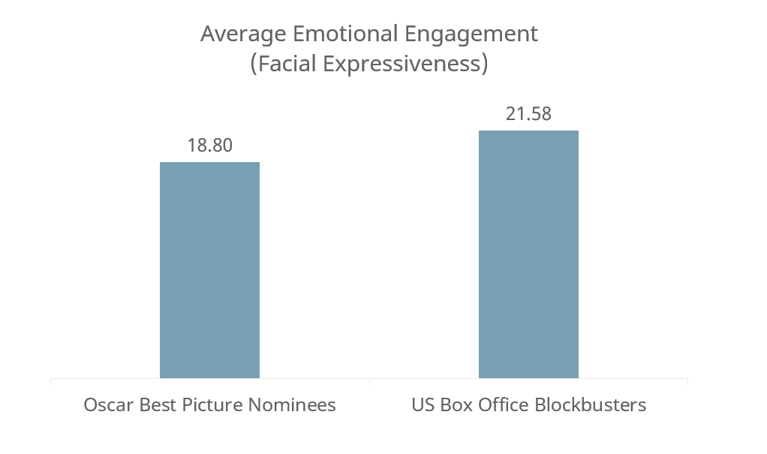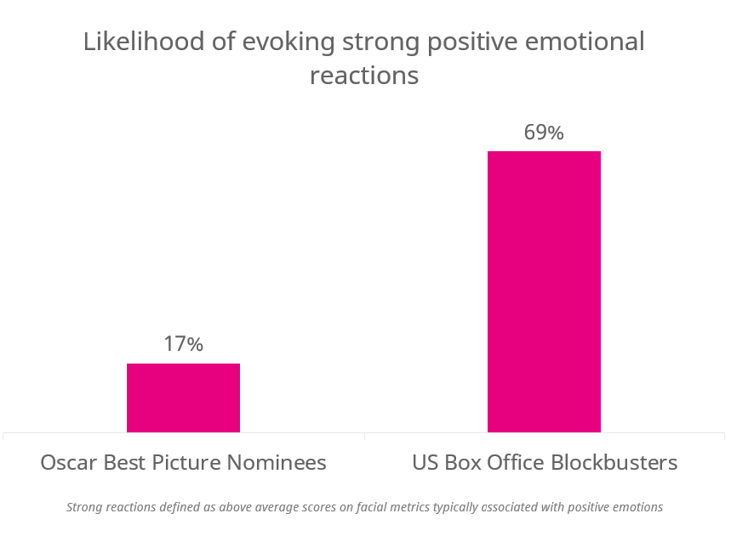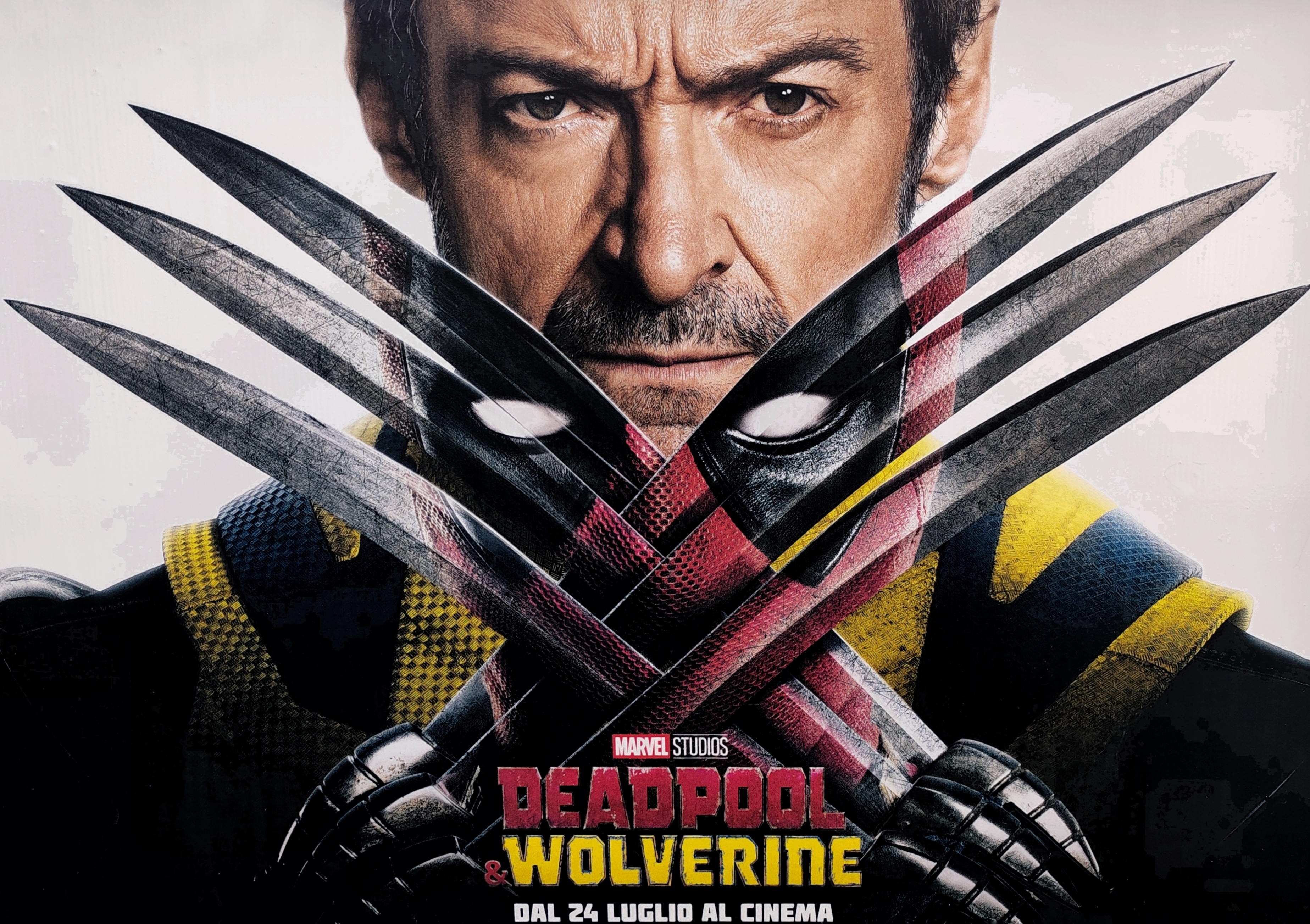It is often assumed that the reason that many blockbusters don’t generally do well at awards ceremonies is that they lack the emotional depth of the ”serious” films that tend to dominate. New analysis using Affectiva’s Emotion AI technology suggests that’s not true – in fact Blockbusters may pack a bigger emotional punch – albeit, of a different type. The success of Everything Everywhere may mark an interesting change of tack in the Academy’s choices.
The stunning Oscars sweep of the fabulous Everything Everywhere All at Once is notable for many things: first Asian woman to win Best Actress, the amazing backstory for Ke Huy Quan’s Best supporting Actor award, and Jamie Lee Curtis finally picking up the Gold Statuette to name but a few. But it’s also noteworthy because this feels like a different type of film: funny, sci-fi action movies don’t frequently appear on the list of nominees, let alone winners. So the Media Analytics team at Affectiva set out to investigate if this is just perception, or if there were typically differences in the emotional signatures of Oscar-nominated films versus, say, US Box Office top performers, that have been tested using our Emotion AI technology.
At Affectiva, we test a huge amount of content, ranging from full films, episodes and trailers, but we have the most data on these two categories of films from the trailer testing that we do. So, we used the results from trailers as proxies for the films. Clearly this will not replicate the full emotional journey people take when watching the films – but as a signal regarding the emotional tone of the movies, they provide a pretty good guide. We pulled the data from the US market on as many trailers as we could across the Oscar Best Picture nominees, and the top 10 highest grossing movies from the last couple of years, to make some comparisons.
Interested in learning more? Let’s jump right into the data!
Deep dive: understanding the data
First up, it is clear that it’s not just Oscar Nominees that pack an emotional punch. On our overall measure of engagement (Overall Facial expressiveness while watching), Blockbusters, in fact, did better than Oscar nominees on average. So, we can make the case that, judging from audience reactions to the trailers at least, that blockbusters get a bit of a bad rap when it comes to emotional power.
What is also clear is that the nature of the emotions being evoked tends to be very different between Blockbusters and Oscar Nominees. In particular, we found that Blockbusters elicited far more positive reactions than Oscar nominees. In fact, they were four times more likely to score above average on positive emotional metrics than negative metrics. Not surprisingly, Blockbusters are much more likely to be feelgood movies, judging from their trailers.
Unpacking this further, we found that Blockbusters tend to score higher on metrics such as joy, smiles, sentimentality and surprise, and they scored far lower on indicators of sadness. In contrast, Oscar Nominees were especially lower on joy and smiles and higher than blockbusters in eliciting brow furrows, especially sadness responses like downturned mouth expressions. The chart below maps different emotional responses, as indicated by facial reactions, to Oscar Nominees, Blockbusters, and all other movie trailers. The association between Blockbusters and positive emotions, and Oscar nominees with sadness, is very clear.
The role of genre
Partly this pattern of associations is to do with genre – Oscars nominees are way more likely to be dramas and that is reflected in our sample of trailers. Our analysis of average responses by genre makes it clear that dramas tend of over-index on Sadness and similar reactions. But the results go beyond that, as for instance the Sci-fi Oscar Nominees tended to have a less positive emotional tone than their Blockbuster siblings. And it is not true to say that Blockbusters are simply eye candy. The two categories draw people in differently, and Blockbuster trailers reflect their nature – more “wow”, more fun, with more tension, whereas Oscar Nominee trailers have tended to be more serious, “quieter,” introverted pieces.
And the winner is…?
There’s no winner per se in our analysis; the two categories of movie trailers seem to be drawing people in differently – blockbusters do it with spectacle and action – but arguably are more emotionally intense as result. They engage because of the show, and the storytelling, whereas Oscar nominees may hook people with the darkness of the scenario or the characters. It’s no surprise that until now, Oscar Nominees tended to be more serious films – and clearly sadder, serious themes have been more likely to be deemed Oscar-worthy. But our data suggest blockbusters may still pack an emotional punch, even if it is of a different nature to the typical Oscar nominee.
The success of Everything Everywhere therefore feels like an interesting moment – the Academy appears to have gone against its historical instinct for darker pieces, to pick something that has enormous emotional power, combined with positivity, fun and action. Whether this is a one off or a deeper change, we’ll see – we can’t wait for next year already!
Methods: how we looked at the data
We analyzed a selection of the trailers for Oscar Best Picture nominees from 2022 and 2023, (largely corresponding to releases in 2021 and 2022) and Domestic Box Office top performers in 2021 and 2022. From there, we did a deep search in our database for trailers and teasers of these films that were tested using our Emotion AI technology in the US market, grabbing the summary metrics and normative data for these movies, approximately 21 films overall, with data drawn from 38 trailers. By doing so, this enabled us to compare and contrast films to see where there may be synergies or differences in emotional engagement and responses towards these movies, using their trailer as a proxy.
In reviewing our Affectiva database and sourcing films that were blockbusters and Oscar Best Picture nominees, we averaged the film emotional norms for every facial expression and emotional state across each category list, comparing it to each other and to our norm for all trailers that were tested with the US market.
Understanding viewer emotional engagement with content such as movies and trailers is key to creating experiences that make the viewer want to see more. Contact us to learn more about how Affectiva can help test your entertainment creative content today.

.jpg?width=600&height=400&name=shutterstock_535946224%20(1).jpg)


.png?width=790&height=410&name=image%20(3).png)




